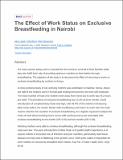| dc.contributor.author | Lakati, Alice | |
| dc.contributor.author | Binns, Colin | |
| dc.contributor.author | Stevenson, Mark | |
| dc.date.accessioned | 2022-03-23T14:15:56Z | |
| dc.date.available | 2022-03-23T14:15:56Z | |
| dc.date.issued | 2002-07-01 | |
| dc.identifier.citation | Lakati A, Binns C, Stevenson M. The effect of work status on exclusive breastfeeding in Nairobi. Asia Pac J Public Health. 2002;14(2):85-90. doi: 10.1177/101053950201400206. PMID: 12862412. | en_US |
| dc.identifier.other | DOI: 10.1177/101053950201400206 | |
| dc.identifier.other | PMID: 12862412 | |
| dc.identifier.uri | https://repository.amref.ac.ke/handle/123456789/625 | |
| dc.description | Full text link: https://journals.sagepub.com/doi/10.1177/101053950201400206?url_ver=Z39.88-2003&rfr_id=ori:rid:crossref.org&rfr_dat=cr_pub%20%200pubmed | en_US |
| dc.description.abstract | For many women today work is essential for the economic survival of their families while they also fulfil their role of providing optimum nutrition to their babies through breastfeeding. The objective of the study is to document the effect of returning to work on exclusive breastfeeding by mothers in Kenya.
A cross-sectional study of 444 working mothers was undertaken in Nairobi, Kenya. About one half of the mothers were in formal paid employment and the rest were self-employed. The mean number of hours the mothers were away from home due to work was 46.2 hours per week. The prevalence of exclusive breastfeeding was 13.3% at three months. Early introduction of complementary foods was high, with 46.4% of the mothers introducing other foods before one month. Breast milk insufficiency and return to work were the main reasons cited for the cessation of exclusive breastfeeding. In a logistic regression analysis the mode of work (fixed working hours versus shift working hours) was associated with exclusive breastfeeding at one month (OR=0.45) and two months (OR=0.39).
Working mothers were able to continue breastfeeding, although the exclusive breastfeeding rates were low. The early introduction of other foods is of public health importance as it exposes infants to increased risk of infection and poor nutrition, particularly diarrhoeal diseases and may lead to flattening of the growth curve. Shift work makes it impossible for some mothers to exclusively breastfeed their infants. Asia Pac J Public Health 2002; 14(2): 85-90. | en_US |
| dc.language.iso | en | en_US |
| dc.publisher | Pubmed | en_US |
| dc.subject | Nutrition | en_US |
| dc.subject | Mothers | en_US |
| dc.subject | Employment | en_US |
| dc.subject | Complementary foods | en_US |
| dc.subject | Diarrhoeal | en_US |
| dc.title | The Effect of Work Status on Exclusive Breastfeeding in Nairobi | en_US |
| dc.type | Article, Journal | en_US |

